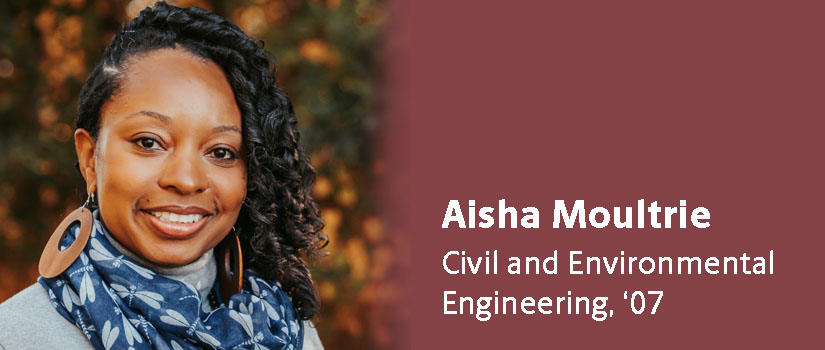Aisha Moultrie graduated in 2007 with a degree in civil and environmental engineering. She has worked for the Georgia Department of Transportation (GDOT) since graduation, advancing from transportation design engineer to her current role as manager of the Subsurface Utility Engineering Program. Moultrie faced many challenges as an undergraduate, but her positive experience in Associate Professor Michael Meadows senior design class played a pivotal role in her career.
What led you to GDOT after graduation?
I was warned during my senior year that it might be challenging to find a job because of the recession and declining job market at that time. A representative from GDOT was at a job fair sponsored by the college that I attended. I was intrigued by the department’s extensive on-the-job training program. All entry-level civil engineers complete an 18-month professional development program where we are introduced to all GDOT offices. It gave me the confidence I needed coming out of school.
What are your responsibilities as manager of the Subsurface Utility Engineering (SUE) Program?
This is a relatively new branch of engineering recognized by the American Society of Civil Engineers that involves how we handle overhead and underground utilities during highway planning, design and construction. Our work identifies where utilities are located and helps ensure that crews won’t hit a gas line or disconnect water during construction. I oversee the program, which involves managing the budget and ensuring SUE is used for projects led by GDOT and that group deliverables comply with federal and state guidelines.
You have held several roles with GDOT over the last 15 years. What do you attribute your advancement within the department to?
I really wanted to make an impact to something relatively new and have always been passionate about design and producing quality roadway transportation projects. I became interested in the SUE discipline and wanted to use my roadway design background to improve safety and reduce unnecessary project costs associated with utility identification and relocation in roadway construction projects. There’s more value in locating utilities beforehand than during construction.
Aisha has been one of the rising stars with the department and quickly built a reputation for herself as one of the top engineers in GDOT’s Roadway Design Group. In her current role, she has taken the Subsurface Utility Engineering group to the next level. Very few states do this well, and once this initiative is complete, Georgia will be ahead of the field.
- Kevin Cowan, GDOT assistant state utilities administrator
What challenges did you face as an undergraduate student?
It was challenging being a black female in this field 15 years ago because no one looked like me. Like anywhere, there were cliques within the program, but with a field as difficult as engineering, you need a support system to rely on and get different perspectives. Instead, I felt isolated and that can play on your psyche when you’re trying to accomplish something challenging.
How did you overcome those challenges, and how did they help you in your professional career?
I was always attracted to what was difficult, and I am more driven when people don’t believe in me. One professor recommended I change my major, but I stayed the path and was the first in my family to graduate from college. During my freshman year in college, I walked on to the basketball team. My former high school coach initially told me I wouldn’t make it, but I did. I use the same approach in my professional life when things are difficult.
Can you share a positive experience that helped you through these challenges?
Dr. Michael Meadows was my senior design professor. When it was time to choose our teams and projects, he told the class he wanted a female to serve as one of the team leaders. This was far out of my comfort zone, but his announcement encouraged me, so I raised my hand and he called on me.
Our project was for a site development where we partnered with a local reverend who was interested in developing a neighborhood with a multiuse building for the community. Our team was successful and worked well together.
The experience taught me the level of communication needed to effectively work with a team, but more importantly, to go after what you want regardless of how intimidating it may appear. I honestly believe that one suggestion from Dr. Meadows opened doors to where I am now.
What students look like doesn’t matter to me. What matters is the job you do. Aisha is a very responsible, take-charge person. She had the drive and motivation to be a team captain and was a good example for others to follow.
- Michael Meadows, associate professor, civil and environmental engineering
What advice would you give to prospective or current students facing similar challenges?
You can do this. You are not alone, and you belong, regardless of how others make you feel. Believe in yourself, and know that no obstacle will break you if you simply don’t give up. It doesn’t matter how long it takes; just do it in your time and know you will come out victorious.
